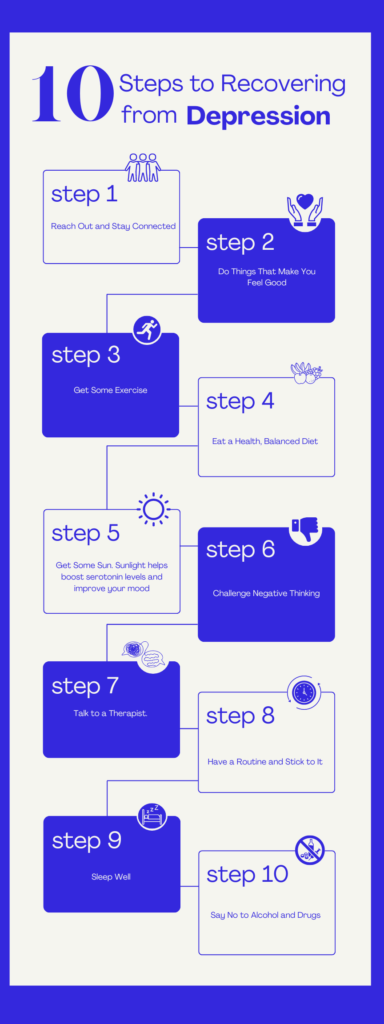10 Steps to Recovering from Depression

Depression is often a term used loosely to describe how we feel from difficult situations that made us feel bad, such as a bad week at work or when going through a breakup. However, major depressive disorder is a type of mental health disorder that is much more complicated and requires professional diagnosis and clinical treatments such as cognitive behavioral therapy. A depressive episode could cause destructive behavior such as substance abuse to deal with depressive symptoms which can turn into drug and alcohol addiction, making depressive symptoms worse. Finding healthier ways in managing depression can help you boost your mood and get through a depressive episode.
Recognizing Symptoms of Depression
Depression can look different in each person and especially between men and women. Some signs and symptoms of depression include:
- Appetite and weight changes, either eating too much or too little
- Changes to sleep habits, either too much sleep or too little
- Alcohol and drug abuse
- Persistent anxious, empty or sad mood
- Feelings of hopelessness or pessimism
- Fatigue
- Feelings of worthlessness, helplessness, or guilt
- Loss of interest in hobbies and activities, including sex
- Issues with memory, concentration, and decision-making
- Thoughts of death or suicide, also suicide attempts
- Restlessness, irritability, and anger
- Persistent physical symptoms that do not respond to treatment, such as headaches, chronic pain, and digestive disorders
How To Overcome Depression In 10 Steps
Clinical depression requires professional mental health help, and you should always seek to go to a counselor or a doctor if your depressive symptoms persist or if you are having suicidal thoughts. However, more mild forms of depression can However, coping with depression with healthy lifestyle changes is possible and these are steps you can take even when you are getting mental health counseling for major depressive disorders:

1. Reach Out and Stay Connected. Getting support is essential to managing depression. You can reach out to loved ones that make you feel safe, keep social activities even when you don’t feel like it, or even a pet can offer connection.
2. Do Things That Make You Feel Good. Even though it may be hard, engaging in activities or hobbies you enjoy can help get you out of our negative thoughts. Spending time in nature is a great way to boost your mood.
3. Get Some Exercise. Just taking a walk can help get your endorphins and feel-good brain chemicals going.
4. Eat a Health, Balanced Diet. What you eat can directly affect how you feel. Minimizing sugar and eating whole foods is a good start. An omega3 fatty acids supplement can help stabilize your mood.
5. Get Some Sun. Sunlight helps boost serotonin levels and improve your mood. Light therapy in the winter can help fight off seasonal affective disorder.
6. Challenge Negative Thinking. Identify destructive thoughts and know they are a symptom of depression and really examine them to see if they’re true.
7. Talk to a Therapist. Talk therapy with a medical professional is often an important part of managing depression.
8. Have a Routine and Stick to It. A regular routine can help when your motivation drops, which can lead to feelings of unproductiveness and low self-esteem.
9. Sleep Well. Getting enough sleep is important for managing depression as well. Try not to stay up late if you need to get up early in the morning to get enough hours of sleep.
10. Say No to Alcohol and Drugs. Although drugs and alcohol can temporarily relieve depression, they can actually make your symptoms worse and lead to substance use disorder when you rely on them to cope with your feelings.
Addiction and Mental Health Programs at Quantum Treatment
Quantum Behavioral Health Services offers comprehensive addiction treatment and mental health services. Some of the addiction treatment treatments we offer include traditional talk therapy, meditation, yoga, art and music therapy, and dual diagnosis treatment to treat co-occurring disorders, such as depression. You do not need to deal with major depression and substance use disorders, there are people who care and want to help you out there. Our addiction treatment specialists are ready to take your call at (609) 993-0733 and get you on the road to recovery and to the life you envisioned.